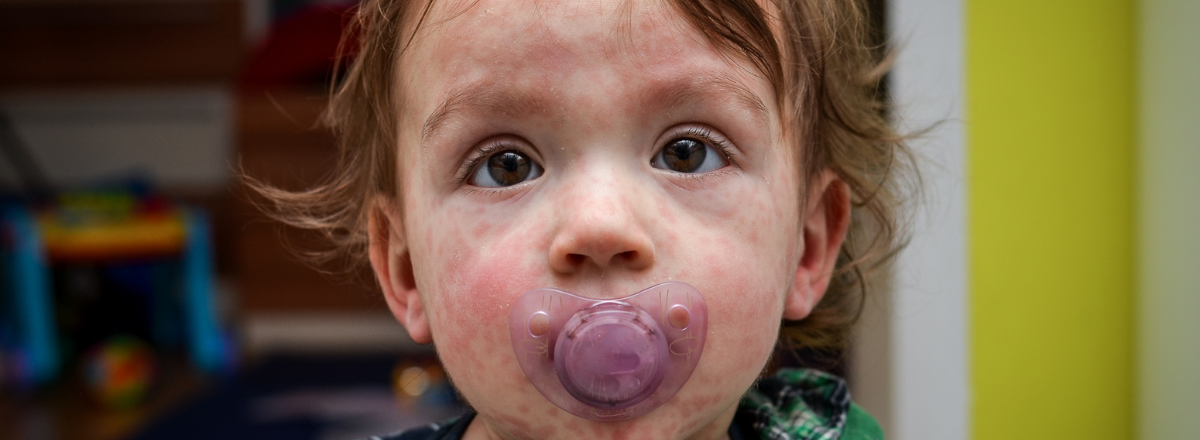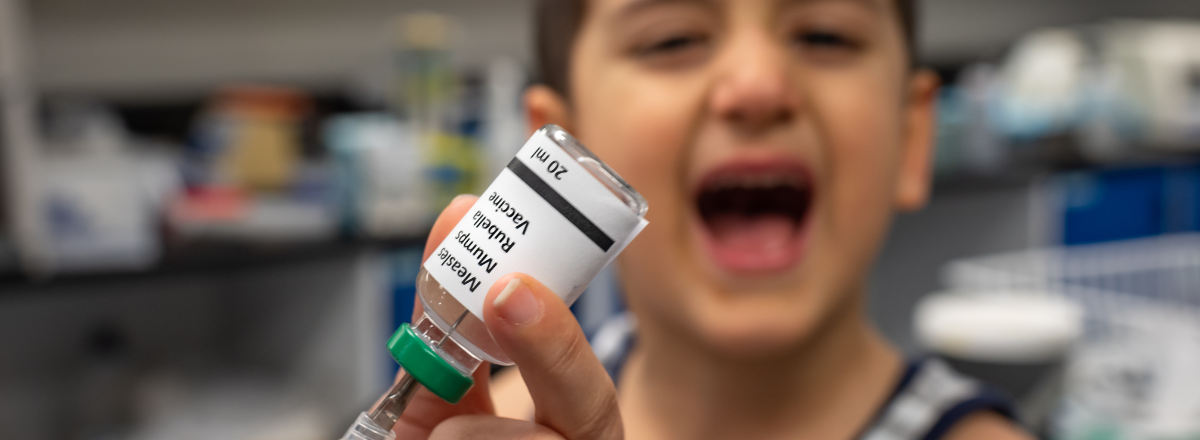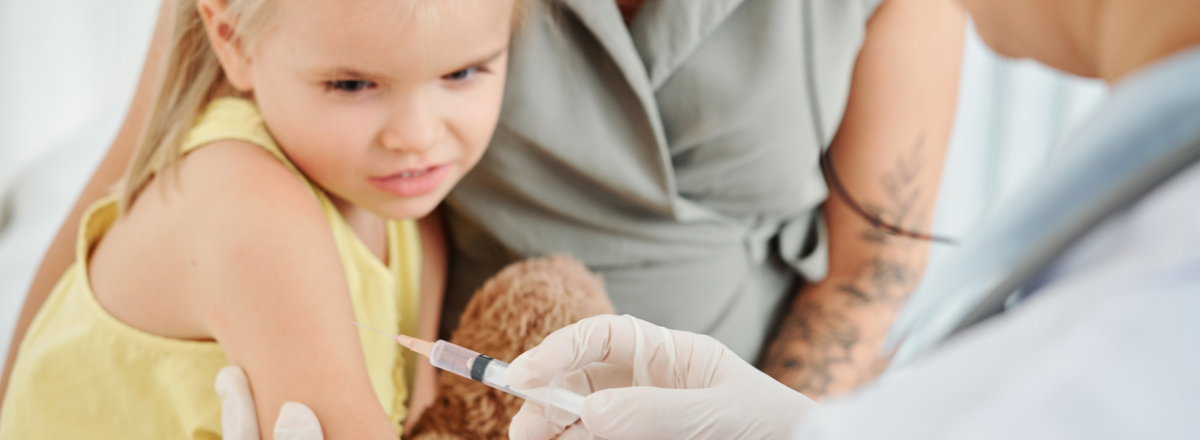With vaccine uptake worryingly low in some areas of the UK and measles cases continuing to rise, a new government-backed campaign is urging parents to vaccinate their children.
Children born in the UK are entitled to free immunisations from the age of 8 weeks. These not only protect them against diseases such as diphtheria, whooping cough, measles, polio and meningitis, they also help eradicate them completely.
However, this only works if everyone who’s eligible comes forward for their vaccinations.
The UK aims for 95% vaccination uptake – the levels of population immunity recommended by the World Health Organization (WHO) that is needed to prevent outbreaks – and childhood vaccination coverage is decreasing year on year, according to recently published government data.
MMR jabs, which protect against measles, mumps and rubella, are at their lowest uptake level in over a decade with only 92.5% having their first jab and just 84.5% having their second recommended vaccine. (Source: RCPCH)
And latest NHS figures show that in the South East of England,only 86.2% of children are fully protected by their 5th birthday, meaning around 1 in 10 are not fully protected by the time they’ve started school.
This means diseases that were once eradicated, return. For example, the UK had a measles-free status in 2016 and 2017 only for it to return in 2018.
‘This is dangerous, even potentially life-threatening for anyone who catches them,’ says ZoomDoc GP, Dr Clare Tong.

Measles outbreaks are occurring in every region of the world. Since October 2023, there have been 733 confirmed cases in the UK.
Measles cases are continuing to rise this year, with 650 cases confirmed since October 2023. (Source: Gov.uk) To put that into perspective, there were a total of 54 cases in 2022. Not only that – traces of poliovirus, linked to a disease that hasn’t been seen in the UK since the mid 1990s, have also been found in London’s sewers.
Whether it’s due to busy schedules, misinformation or (wrongly) assuming you’ve left it too late, it’s vital to vaccinate children for three key reasons:
- to protect them against serious diseases
- to help eradicate disease from society
- to help protect others who are too young or too vulnerable to be vaccinated.
‘Vaccines save lives,’ says Dr Clare.
‘Not only do they protect your child against some really unpleasant and unpredictable diseases, they can also protect others who can’t be vaccinated due to specific health conditions, such as a chronic disease or compromised immune system,’ she says.
Addressing the different reasons for not having vaccinated your child yet, Dr Clare offers this advice and reassurance to parents:
It’s not too late to have them
‘Although it’s a good idea to have vaccinations at the time they’re offered, it’s still better to have them late than never. Call your GP as they will have a record of what’s been done and can make any routine or catch-up appointments required,’ she says.
Vaccines are safe
‘No vaccine can be approved without extremely strict safety checks performed by the Medicines and Healthcare Regulatory Authority (MHRA) and then by the Joint Committee on Vaccination and Immunisation (JCVI). They really are the most effective way to prevent against disease,’ she says.

The MMR vaccine is a safe and effective and it protects against 3 serious illnesses: Measles; Mumps and Rubella
The MMR vaccine has no link to autism – ‘Studies have found no evidence of a link between the MMR vaccine and autism,’ assures Dr Clare.
Unfortunately this link (and with it plenty of misinformation) is still out there online for concerned parents to read about. Make sure you only read reputable sources such as the NHS and WHO and know that the doctor who believed in it back in 1998 was discredited by the General Medical Council and found guilty of misconduct, dishonesty and unethical behaviour.
The National Autistic Society is also clear that there is no link between autism and the MMR vaccine.
Children’s immune systems aren’t overloaded by vaccines
‘It’s perfectly safe and sensible to give children several vaccines at a time. In fact, doing so reduces the amount of injections needed,’ says Dr Clare.
Side-effects are normal
‘Any medicine, medication or vaccine comes with a small risk of side effects, usually a slight fever or pain where it has been administered. These will be mild and won’t last long though’ says Dr Clare.
Find more information about booking your child’s vaccinations here.
Children’s vaccinations: what’s due and when?

It’s important that vaccines are given on time for the best protection, but if you or your child missed a vaccine, contact your GP to catch up.
Babies under 1
From the age of 8 weeks your baby will need three appointments every 4 weeks. Here’s what they’ll have at each one:
8-week appointment
6-in-1 vaccine
Rotavirus vaccine
Men B
The 6-in-1 protects against these 6 childhood diseases:
- diphtheria
- hepatitis B
- Hib (Haemophilus influenzae type b)
- polio
- tetanus
- whooping cough (pertussis)
12-week appointment
6-in-1 vaccine (2nd dose)
Pneumococcal (PCV) vaccine
Rotavirus vaccine (2nd dose)
16-week appointment
6-in-1 vaccine (3rd dose)
Men B (2nd dose)
6 months+
COVID vaccine – available for 6 months+ with a weakened immune system only. The NHS will contact those eligible for seasonal COVID vaccines.
Toddlers (1-5)
Age 1
Hib/Men C
MMR
Pneumococcal (PCV) vaccine (2nd dose)
Men B (3rd dose)
Age 2+
Flu nasal spray (every winter from the age of 2)
Age 3 and 4 months
MMR (2nd dose)
4-in-1 pre-school booster
This boosts their protection against:
- diphtheria
- tetanus
- whooping cough
- polio
Primary school age
Flu nasal spray (every winter until year 11)
Chickenpox vaccines – what’s the latest? Find out here
Secondary school age
Age 12/13
HPV vaccine
Age 14
3-in-1 teenage booster
Men ACWY
The 3-in-1 protects against:
- tetanus
- diphtheria
- polio
